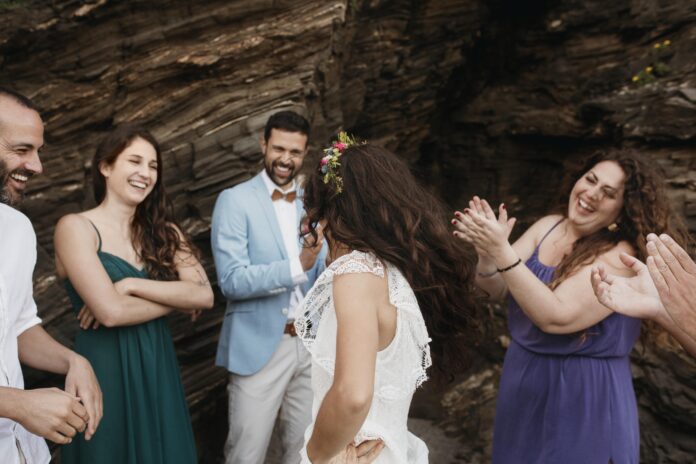By Haniyah Philogene/Originally published by thegrio
Wedding season is fully underway, and every year, while love fills the air, debates about wedding etiquette reemerge online. Most recently, social media users across Instagram Threads and Facebook have entered heated discussions about whether or not single attendees should be allowed a plus-one at wedding celebrations. On Wednesday, actress and comedian Robin Thede amplified the issue, crowdsourcing her followers’ thoughts on the matter.
“Should a single person who has no significant other be allowed a plus one at a wedding? Would you want a casual date to be at your wedding if you’d never met them?” Thede asked on Threads.
Sparking discussions about proper etiquette for wedding guests, costs and more, both sides of the debate have highlighted several reasonable points. Here are some of the main takeaways from the social media discourse:
Weddings are expensive
It’s no secret that inflation has found its way into every industry, making the costs of damn near everything skyrocket. However, the price tag for line items in the wedding industry is particularly high. According to Zola, an online wedding registry, wedding planner and retailer, couples’ wedding expenses cost $33,000 on average in 2024. As Forbes highlighted, the average wedding costs are subject to change depending on the region, with states like New York and Connecticut averaging over $39,000 and $49,000. Interestingly enough, The Knot found that even though the average wedding guest count decreased in 2023, the average cost per guest increased to $304 from $256 per guest in 2022. Given these numbers, it’s understandable that some couples may be reluctant to give every single guest a plus-one.
“Weddings cost A LOT and per head,” wrote New York Times bestselling author Luvvie Ajayi Jones on Facebook as she weighed in on the debate. “It adds up, so a single person bringing a person that neither bride or groom knows AND isn’t their significant other is taking [one] more person away from the list that the couple actually might want to be there.”
“Folks don’t wanna pay an extra $200 [per plate] for folks they don’t know. I get it,” one user commented on a Facebook thread about Thede’s post. “Talk to the people next to you at the singles table. You’ll be OK alone for a couple [of] hours. … Also, there’s the option not to go. Spending $200pp on multiple people adds up quickly. [Just] because I like my friend doesn’t mean I want to blow my budget paying for strangers.”
Weddings can feel a little awkward
While celebrating a friend or family’s nuptials is a special milestone, the actual ceremony and reception can be a bit awkward for some guests. Whether they’re introverts, hate small talk, or are unfamiliar with other relatives or friends on the guest list, sometimes that plus-one serves as a buffer for the awkwardness that surfaces during large events like weddings. While some people bring casual dates as plus-ones, others opt to bring good friends who’ll bring good vibes to the celebration.
“I’ve never taken a date to a wedding but have absolutely taken good friends,” one user responded on Threads. “Why can’t I go with a good friend who is a fun [time], but your cousin can bring her cantankerous husband who sucks the air out of a room with negativity just because of a title?”
“I LOOOVE weddings. I always cry,” another user added. “But sitting alone with no one to talk to is not all that fun. I’d be happy for them getting married but I’d be happier if I had someone to talk to and dance with. And there’s no point in lying about it.”
“The +1 isn’t just about having another person at your wedding that you know, it’s also about making sure your guests are comfortable and have someone they know with them,” a commenter highlighted. “Going to a wedding single and alone SUCKS! If you don’t give someone a +1, def your right, but do not be offended when they decline the invite.”
Why alienate single guests?
Amidst the discourse about costs and comfortability, some users took offense to the way single people were being alienated.
“I hate how single folks are viewed when it comes to weddings or even ‘couples’ events,” one Facebook user posted in response to Thede’s post. “‘No significant other’ is wild! I can’t bring a friend or my sister or a guy I’m dating who I like?!?? Geesh!”
While couples reserve the right to do as they please during their wedding, some prospective guests found the idea of not offering a plus-one to a guest simply because they are single to be controlling. Although Thede posed a problem with unknown “casual dates” taking the plus-one slot, the same could apply to guests bringing a significant other that the couple doesn’t know, or worse, doesn’t like.
“Married people getting deferential treatment in these scenarios is weird to me,” a commenter added on Facebook. “These people talking about costs are missing [the] point because do cost issues only [apply] to single folks?!?”
“As someone who was [maid of honor] in a wedding, I can 100% understand the whole cost thing…HOWEVER, if cost is indeed the issue then NO ONE should get a plus one. If you aren’t married or engaged, you don’t get a plus one. End of story. Make it fair all the way around. Don’t just single out the people who are single or in a new relationship. It can feel alienating,” another user suggested.
It’s not about you; it’s about the vibe the couple hopes to curate
Weddings are a celebration of love, and most times, couples want to be surrounded by the people they know and love. Though weddings can be awkward, they don’t have to be stiff. One of the easiest ways to avoid that is by thoughtfully considering the guest list. On the pro-plus-one side of this debate, many users stressed the discomfort that comes with not knowing anyone in the space. However, as Jones mentioned in her Facebook post, the chances of guests not knowing or being familiar with anyone else is slim if the couple intentionally invites people they love.
“No one at my wedding knew ZERO [people] cuz it was only people I deeply loved and if I love you, you’ve met someone else in my life before,” she said, reminiscing on her wedding ceremony.
“For me, weddings are intimate and represent the people [who] have supported and will continue to support my marriage / future family. I wouldn’t want someone that isn’t deeply connected to me or my spouse at my wedding,” another user shared on Threads.
So, if a couple doesn’t offer a plus-one in the invitation, it may not be an attack on a guest’s relationship status. It may simply be their thoughtfulness about who they want to share the space with on their special day.
Image: freepik



































